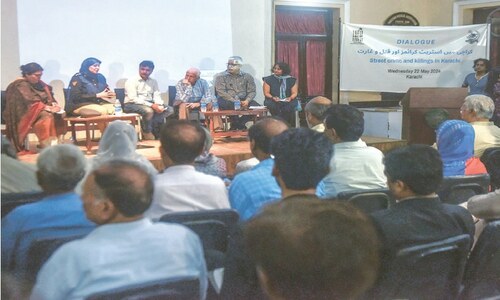WHAT were things like in our part of the world when man had not landed on the moon? Hard to say! There must be excitement though, as quite a few space programmes had already begun to navigate the wide and unexplored world over our heads. Some experiments had enabled scientists to get the hang of things on the moon. And not all of it was based on conjecture.
On Nov 17, 1964 a film depicting the surface of the moon from a close distance was shown at the offices of the Pakistan Association of Scientists and Scientific Professions (PASSF). Director of the meteorological department, S. N. Naqvi, was the chief guest at the screening. Those who saw the film were of the view that it revealed the hitherto unknown facets of the celestial object that appeared to be rough from close quarters. Well, rough they were/are, as five years later the entire world saw when Neil Armstrong floated in the air to touch down on the moon.
This does not mean that the authorities concerned in the ‘60s were only enamoured with space and were not aware of ‘ground realities’ at the time. The same day, Karachi commissioner Roedad Khan announced a four-member committee to come up with a scheme to establish and promote housing projects on a cooperative basis in Karachi for the people of low- and middle-income groups. Come to think of it, if such a plan was to be made today, land grabbers would have had a field day, literally and figuratively.
That week, a Venetian ensemble called I Solesti Veneti was in town. The ensemble was formed in 1959 to revive Venetian traditions in music. When science buffs were watching a film about the moon on the PASSF premises, music lovers had gathered in the Metropole hotel to listen to I Solesti Veneti. If reviews are anything to go by, the audience thoroughly enjoyed the performance.
However, contrary to what many of us think, the hotel business in the ‘60s didn’t have free reign. On Nov 19, the district magistrate of Karachi ordered with immediate effect that no hotel, restaurant, coffee house, milk shop, lodging house, snack bar and billiard room would remain open after 10pm in the district of Karachi except with the magistrate’s written permission. One is not sure about the reason for issuing the order but it is pretty unlikely that the magistrate wanted to save electricity from being wasted. The city wasn’t bursting at the seams (read: crisscrossed with electricity cables) with population.
On Nov 20, the vice chancellor of the University of Karachi, Dr Ishtiaq Husain Qureshi, inaugurated an ethnological museum at the sociology department. The museum was set up to ‘trace and study the sources of Pakistani culture’.
Speaking on the occasion, according to a published report, the vice chancellor said vivid knowledge of the past was essential to have confidence in the present condition of our culture. It begs the question: What happened to that ethnological museum? Even if it is still there, have we succeeded in tracing the sources of Pakistani culture? After all, 50 years have passed since.
On Nov 22, chairman of the National Science Council Dr Salimuzzaman Siddiqui opened the Haji Abdullah Haroon College Union at Khadda. He stressed the importance of hard work to develop the only college established in one of the backward areas of the city.
Published in Dawn, November 17th, 2014














































Dear visitor, the comments section is undergoing an overhaul and will return soon.